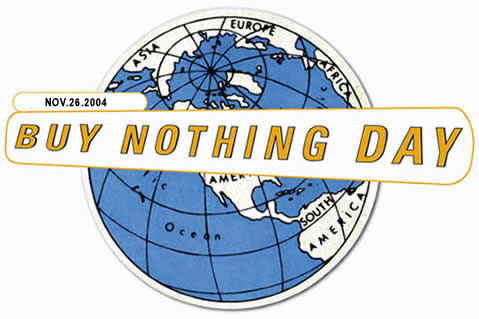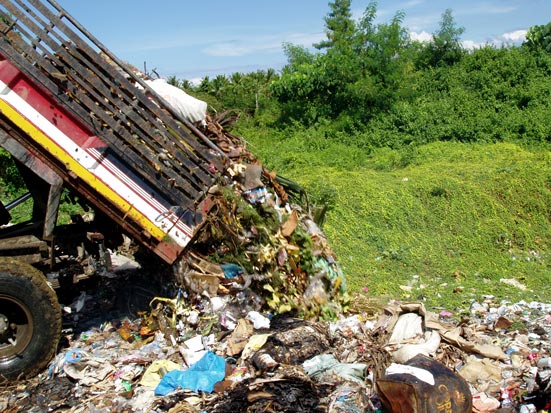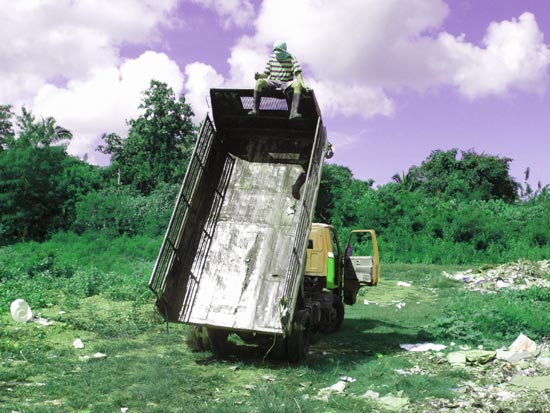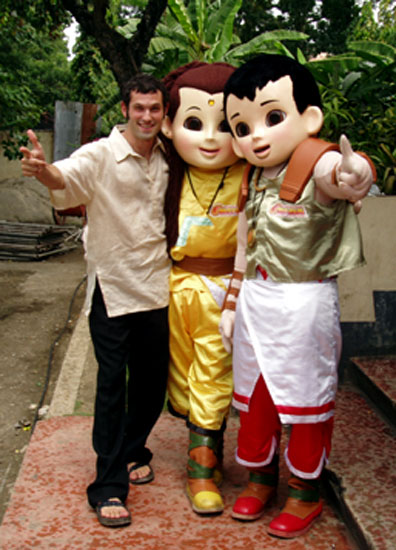November 24, 2004
Buy Nothing Day.
I didn't write the below text, but I am an excited messenger. After all, I'm fighting to reduce trash and save the environment. If we weren't all such rampant consumers, we wouldn't be in half the messes we are in now...

FRIDAY, NOVEMBER 26 2004 IS BUY NOTHING DAY
For 24 hours, millions of people around the world do not participate -- in the doomsday economy, the marketing mind-games, and the frantic consumer-binge that's become our culture. We pause. We make a small choice not to shop. We shrink our footprint and gain some calm. Together we say to Exxon, Nike, Coke and the rest: enough is enough. And we help build this movement to rethink our unsustainable course.
In its 13 years, BND has become a flashpoint, a day when people of all stripes come together in symbolic protest.
visit: adbusters and buy nothing day.
November 18, 2004
Purple Haze.


I have approximately three major items on my agenda at the moment:
1. Help improve the municipal solid waste management system, and turn trash into cash and gardens.
2. Ensure an environmentally-friendly disposal system for chemical dye waste.
3. Get some of the local producer groups selling their goods to wholesale buyers online, in order to cut out the middle-man. (Plus, many international buyers who used to go to trade shows now do their buying online.)
Number one is already underway, number two will happen if and when the common dyeing center is build, and number three might happen when I learn how to explain the internet in the Cebuano language.
One might assume people would come running when you say "Hi, I'm here to help you with your trash. I will teach you how to throw as little waste as possible into bins that end up at the dumpsite, and compost as much as possible for use in your gardens. And I'll help you organize a program to sell your recyclables to junk buyers, and maybe sell some compost to farmers so they don't need to use as much chemical fertilizers to grow the food you eat and feed to your kids."
But people are busy and not ready to change their ways so fast when a foreigner shows up to try to tell them how it's done. And things seem to be going alright. After all, there are still fish in the sea (although there are many fewer than a few decades ago), the water is still drinkable (although probable contaminated), and the land is still producing fruits and vegetables. So why should they be more concerned about minimizing trash?
How about Malcolm Gladwell's ketchup bottle principle? You turn the ketchup bottle upside down and shake and shake and nothing happens. Then, suddenly, out comes three times as much ketchup as you can possibly handle on your fries. I might try carrying a ketchup bottle with me, but I'm not sure I can make the connection between ketchup and trash in Cebuano. Plus, ketchup ain't cheap, and fries cost a fortune. (By the way, ketchup here is usually banana-based. Don't worry, it's still red.)
A year or so ago, the municipality bought a piece of land, equidistant from the river and the sea. It's essentially just a hole in the ground, surrounded by plenty of beautiful trees.
The garbage truck (a small, smoke-belching diesel flatbed) drives around town, collecting everything from chopped banana trees to bags of coconut husks to plastic bags full of kitchen scraps. A good 70-80% is biodegradable. Probably 10-15% is recyclable. When the truck fills up, the truck drives to the dumpsite and dumps everything in the hole. The hole isn't that large, and at some point the hole will fill up. The question is how soon. Obviously, the more "waste" diverted, the better.
The sooner the hole fills up, the sooner the municipality will have to buy another piece of land for more trash, which will leave less money in the already tight budget for things like medical services and education. And that's not even getting into the slew of environmental problems a hole full of trash brings.
When I ask people where the garbage goes, they say "it goes on the truck." Out of sight, out of mind. I don't blame anyone for not knowing or caring where the trash ends up. After all, I have absolutely no idea where any trash I ever threw away in America ended up. (Although it was most likely sent to a landfill in a poor neighborhood.)
So anyway, I am thinking and thinking of ways to get the people here to care more about trash. I am just in the beginning stages and doing lots of reading and investigating. I think the local government, including the mayor, is interested in improving the situation. For one thing, Republic Act 9003, goes into law next year. President Gloria signed the act into law, requiring a certain percentage of trash to be diverted from dumpsites. But of course the government has a million other things to deal with, and the trash system seems to be working at the moment. Citizens aren't lining up to complain.
Yesterday, I visited the elementary school and asked the principal whether I could visit the classrooms and talk about trash. Without hesitation, she said "Absolutely. Thank you many much. If you start before Xmas you can bring all the kids (500) presents." So I've got an in there. (It turns out the principal's son lives in Stockton, California, the same city I lived in in 2003. They just started a municipal curbside composting program there!) The kids are the most important people to talk to anyway, cuz they are curious and they don't have hard-headed habits yet. Hopefully, if nothing else, they'll stop throwing their plastic ice water bags and snack wrappers on the ground.
Oh, the challenges that lie ahead.
November 09, 2004
What the World Needs Now (according to daniel) v1

There's a Native American adage that goes a little something like this: "We don't inherit the earth from our ancestors, we borrow it from our children." These days, we, the citizens of earth, seem to have forgotten this wise and inspiring counsel. Some might say we've reversed it.
With that in mind, I've decided to share some of my thoughts on how to start living "sustainably" again. It ain't gonna be easy to get back on the right track, but it won't be terribly too hard either. And it can definitely be fun. It will certainly be more rewarding if we are in it together, with people we know and care about.
If you find these emails valuable, please do forward them along. If your friends want to get on my list, just have them send me an email at mandatory @@@@ hot mail ............ com. (Conversely, if you feel I'm wasting your time, let me know and I'll remove you from my list.)If you have some comments or ideas you'd like share with me, I'd be happy to broadcast them.
So here goes, I'll start with a double whammy!
1. Affluenza
Last summer, I found this book on my sister's bookshelf. I brought it on a road trip with my brother. I planned to read it aloud while he steered the wheels, but we couldn't help but get sidetracked (by mufflers on the interstate, by friendly Canadians, by old buddies, and by a particular band, which, in the interest of homeland security, will remain undisclosed.) Anyhow, I got around to reading it last Autumn, on successive nights before bedtime. It is witty, entertaining, chock full of fun facts, and better yet, illustrated with cartoons!
But wait, what is Affluenza? The definition of affluenza, according to the authors, is something akin to "a painful, contagious, socially-transmitted condition of overload, debt, anxiety and waste resulting from the dogged pursuit of more."
In chapters with titles like "Swollen Expectations" and "A Rash of Bankruptcies," Affluenza, from the producer of the award-winning TV specials Affluenza and Escape from Affluenza, uses the whimsical metaphor of a disease to tackle a very serious subject: the damage done ó to our health, our families, our communities, and our environment ó by the obsessive quest for material gain. The authors examine the origins, evolution, and symptoms of the affluenza epidemic. But more importantly, they explore cures and suggest strategies for rebuilding families and communities and for restoring and respecting the earth. "A fantastic book, very funny yet deeply serious." ó Peter Barnes, cofounder, Working Assets
You can read the entire first chapter, sadly minus the illustrations at http://www.bkconnection.com/static/affluenza_chapter1.asp
Then, if you want to read the book, you can visit your local library and see if they have it. If they don't, ask them to order it. That way, you don't need to waste your hard earned cash, and tons of people can read it in the future.
If you would prefer to buy Affluenza, try to buy used. That will save trees and also help someone else reduce their clutter. Affluenza is available at:
http://www.half.com
http://www.alibris.com
http://www.booksense.com
http://www.amazon.com/exec/obidos/tg/detail/-/1576751996/102-0899673-6744937?v=glance (they'll offer to bundle it with another book, "spaving" you money. That's slang for saving while spending.)
----
2. The Persuaders
The Persuaders
Frontline
Tuesday November 9, 9pm on PBS Stations.
http://www.pbs.org/wgbh/pages/frontline/shows/persuaders/
Oh yes, television. PBS was my favorite channel back in the days of the 13" B&W set in my parents' room. Doug Rushkoff is an author I enjoy reading. He is as "renaissance man" as you can get. He's got a new show on tonight (if you are in America.) If you miss it, there will surely be reruns. Would someone please tape it for me, since my sattalite dish was gored by caribou. If you're worried about overkill, if more than one person hits record, you can just tape over it later, or slip it to someone at the office.
Synopsis:
Correspondent Douglas Rushkoff takes an in-depth look at the "persuasion industries" ó advertising and public relations. To cut through mass-media clutter and to overcome consumers' growing resistance to their pitches, marketers have developed new ways of integrating their messages deeper into the fabric of our lives, using sophisticated market research techniques to better understand consumers, and turning increasingly to the little-understood techniques of public relations to make sure their messages come from sources we trust.
A documentary essay, The Persuaders also explores how the culture of marketing has come to shape the way Americans understand the world and themselves, and how the techniques of the persuasion industries have migrated to politics, shaping the way our leaders formulate policy, influence public opinion, make decisions, and stay in power.
November 02, 2004
Bisan Hinay Basta Kanunay.
In case you are an American citizen registered to vote (or residing in a state that allows Election Day registration, like Wisconsin and Iowa) and forgot that the time has come, get your large behinds out of your La-Z-Boy, and get on over to your polling station.
My younger sister Nicole, who is older than my other younger sister, Rebecca Lee (Reelee), scolded me for posting on October 18th without wishing Reelee happy Sweet Sixteen. What Nicole doesnít know is that Reelee and I had a nice long conversation instead. Reelee was probably perfectly happy not having her b-day announced to what Bush #2 refers to as ďinternets.Ē But since whatever Nicole deems important is automatically important, happy belated Rebecca Lee. Sorry you ainít old enough to vote. When I told some high school kids here that you (presumably) started to learn how to drive, they looked at me incredulously. Around here, itís nothing special to see a ten-year-old driving a motorcycle (with a whole bunch of friends piled on.)
Before I leave you thinking Nicole is just another meddler, Iíll tell you about the special gift she sent me the other day. Itís a red maple leaf, inscribed, ďYouíre missing a great autumn. Ithaca, October, 2004.Ē
OK, now, last I left off, Iíd neglected my Japan entry, and barely mentioned my life as a garbage man. I was headed to Tagbilaran for the college graduation of Riza Ramos, my Tagbilaran host sister. She graduated with an Education Degree specializing in English, and had to leave her own party early to catch a night boat to Cebu, where she was starting a job as an English teacher at a private school for Koreans (probably mostly businessmen) to take crash courses in English. They come here to cram because tuition is cheap. Riza makes P40 (P56=$1) an hour.
Then I headed up to Manila for a doctorís appointment . I had to get a shot, and fainted, two minutes after the injection. The band-aid was on already. It was quite bizarre. I felt like an eggplant seed, shot into space.)
Next on the agenda was four days at Manila FAME, a huge trade fair for wholesale buyers. Now I know where Pier 1 gets all their stuff, and how much they pay for it (or rather, how little.) I was there to represent a few small producer groups who had their gorgeous loom-woven and coconut shell products showcased in the main foyer. (The producers themselves had no money for a flight or boat ride, but Peace Corps footed the bill for mine, because I was headed to IST.)
IST is In-Service Training, held at the University of the Philippines-Los BaŮos campus. Itís where all the batchmates get together and discuss what life has been like for the past six months. There are thirty-nine of us, out of the original forty-one in Batch 263. Apparently, such a low defection rate is unheard of. I guess itís due to good site placements and tight-knit friendships (made durable by virtue of text-messaging.) In fact, my friend Dan Nover, who has a whole slew of awesome friends back home, has decided to marry a delightful Batch 262 girl called Cindy, and has pegged me as a front-runner in his best man search.
Before I forget, let me explain the voting situation here. Most of us registered long ago for absentee ballots. Most of our ballots had not arrived by mid-October, which made us eligible to fill out the FWAB (Federal Write-In Absentee Ballot.) To do so, you had to call the US embassy and request one. Each person had to call to request their own FWAB. This was a fairly easy process, but an extra hassle nonetheless. One of my batchmates, Marla, decided to actually go to the embassy and fill out her ballot there. Miraculously, she convinced the ACS (American Citizen Services) window personnel to give her a whole stack of FWABs to bring to IST. On October 25, nearly all the yet-to-vote 263ers filled out FWABs and the Peace Corps SUV (you would think that would be an oxymoron) whisked them to the embassy, where they were thrown in the diplomatic pouch and rocket-launched to our respective precincts. The day after I voted, my real absentee ballot arrived. I filled that out too. (I followed the directions on the FWAB.) Without saying who I voted for, if John Kerry loses New York, it sure as the cock will crow at dawn ainít my fault.
Our language teachers also joined. Thereís nothing better than a good language lesson, and Ibeth is top-notch. I needed tons of help with Cebuano and enjoyed the lessons so much that I stayed in a couple nights for overtime while most of the others hit the bars and billiard halls. I now know the stories of the Tortoise and the Hare and the Hungry, Hungry Caterpillar, in Cebuano.
We had a few field trips at IST. There was the small mushroom farm, where they use banana leaves ingeniously to cultivate nutritious fungi. Then there was a museum of natural history, the centerpiece being a map of the Philippines made entirely of cockroaches and the rice-paper making factory, where, sadly, burning plastic seems normal to the workers. (Actually, plastic melts.) We visited the International Rice Reseach Institute, featuring a display of rice-farmer hats from around the world. Nobody could answer this question: When pesticides ruin all the arable soil here on Earth, I wonder what kind of hats lunar rice-farmers will wear?
Finally, we visited the botanical garden and raptor sanctuary, where some say I almost killed a sea eagle. Iíd like to argue it was the sea eagle who almost clawed me to death in the pouring rain.
IST was a nice break, but by the end of the week, everybody seemed pretty antsy to get back to site. My trip back to site (accompanied by Justin and Pete) consisted of a bus ride, two cab rides, a twenty-two hour boat ride, two more taxis, another two-hour boat ride, a walk down the Tubigon pier, and a super-crowded bus ride, that dropped me off at my front door, just in time to surprise Sonny for his birthday.
I will wake early tomorrow (Wednesday morning in the Philippines, Tuesday night in America) to catch a bus to Tagbilaran where Iíll sit in front of the TV all day. My viewing options are CNN, BBC, and FOX. At dinnertime, I hope to celebrate with an ice-cold spiked mango shake.
Next time I log in Iíll explain why my Peace Corps projects ainít what they used to be, and probably let you know what the Filipinos wonder about President #44.